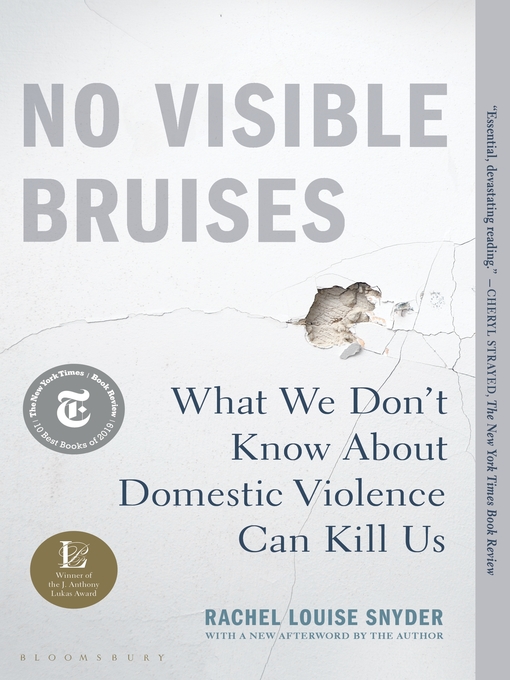
No Visible Bruises
What We Don't Know About Domestic Violence Can Kill Us
کتاب های مرتبط
- اطلاعات
- نقد و بررسی
- دیدگاه کاربران
نقد و بررسی

Starred review from April 15, 2019
In this powerful investigation into intimate partner abuse, journalist and professor Snyder (Fugitive Denim) makes the case that “domestic violence, rather than being a private problem, is a most urgent matter of public health.” She humanizes the price tag—victims in the U.S. collectively miss more than eight million days of work per year, and health-care costs borne by taxpayers exceed $8 billion annually—with closely observed, compassionate portraits of victims, advocates, abusers, and police. She also examines the interplay of culture, circumstance, and shame that keeps women with abusive partners, displaying a thorough understanding of systemic problems, including the lethal combination of common contributing factors, among them poverty, addiction, narcissism, and easy access to guns (in the U.S., 50 women a month are shot and killed by their partners). Balancing the gut-wrenching stories are hopeful explorations of resources that could prevent domestic homicides, including the Danger Assessment instrument used by medical professionals to assess an abuse partner’s risk; programs that try to rehabilitate offenders; and comprehensive approaches to victim protection, such as that of DASH in Washington, D.C., which offers shelter to victims without disrupting their access to their homes, jobs, or communities. Penetrating and wise, and written in sometimes novelistic prose, Synder’s sobering analysis will reward readers’ attention. Agent: Susan Ramer, Don Congdon and Associates.

December 1, 2018
If domestic violence really was that bad, wouldn't victims just walk out? Anyway, we've got an adequate shelter system, and such violence is unrelated to issues such as mass shootings and sexual assault. These are just some of the myths shredded by journalist Snyder, an associate professor at American University, who points out that domestic violence accounts for 15 percent of all violent crime nationwide and is considered a global epidemic by the World Health Organization. Winner of the J. Anthony Lukas Work-in-Progress Award.
Copyright 2018 Library Journal, LLC Used with permission.

Starred review from March 15, 2019
A powerful exploration of the sinister, insidious nature of domestic violence in America.As an international reporter for more than two decades, Snyder (Literature/American Univ.; What We've Lost Is Nothing, 2014, etc.) encountered regular acts of violence against women adjacent to the issues she covered. The grim statistics about and the prevalence of unreported incidents both startled and motivated her to begin chronicling the universality of an issue that "is too often hidden." Through a graphically portrayed series of in-depth profiles, the author discusses how domestic violence has reached epidemic levels while efforts to curb the trend have been historically underfunded and ineffective. She elucidates this point in stories spotlighting both victims and assailants alongside the investigators and family members who've become all-consumed with sleuthing the crimes that have torn their relationships apart. She also tackles the complex conundrum facing victims of familial violence who choose to remain in abusive households. Intriguingly, Snyder probes the chilling territory of the perpetrators, sketching them from the inside out. Especially memorable is the author's incisive coverage of the communities responsible for creating change through victim advocacy, rehabilitative jail programs, batterer intervention groups, and transitional housing. In one scene, Snyder describes a state prison's group therapy session in which former abusers discuss "their own incidents of violence, times they...denied any wrongdoing, moments they manipulated or verbally threatened partners [and] instances of trivializing their own violent events. They begin to see, some of them for the first time ever, the effect their violence may have had on their victims." As these stories and perspectives evolve and deepen, the author contributes her own profound introspection on the nature of empathy and relatability, weaving in themes of enduring emotional trauma, the resilience of "deep stereotypes," and the many manifestations of physical and emotional violence.Bracing and gut-wrenching, with slivers of hope throughout, this is exemplary, moving reportage on an important subject that often remains in the dark due to shame and/or fear.
COPYRIGHT(2019) Kirkus Reviews, ALL RIGHTS RESERVED.

March 15, 2019
Although domestic violence is a difficult subject, this sympathetic look at victims, perpetrators, and intervention efforts by law enforcement and social agencies makes for compelling reading. Journalist Snyder takes readers beyond headlines and mind-numbing statistics, sharing specific cases brought to life through her thorough research, perceptive observations, and in-depth interviews. Snyder profiles victims, surviving families and friends, perpetrators caught up in cycles of abuse, detectives, prosecutors, and others who see the evidence of domestic abuse all too often. This is not a series of individual commentaries but rather honest, ongoing conversations, with multiple instances of horror, fear, guilt, bravado, remorse, forgiveness, and frustration. Along the way, readers learn about experimental programs and policies designed to diminish the stigma associated with being abused, disrupt inbred violent behaviors spawned by generations of abuse, and provide protection and justice for victims, along with their varying levels of effectiveness. Snyder's chilling body of evidence shows that domestic abuse is a pervasive epidemic that can and does happen everywhere?and that there are no easy solutions in sight.(Reprinted with permission of Booklist, copyright 2019, American Library Association.)

























دیدگاه کاربران